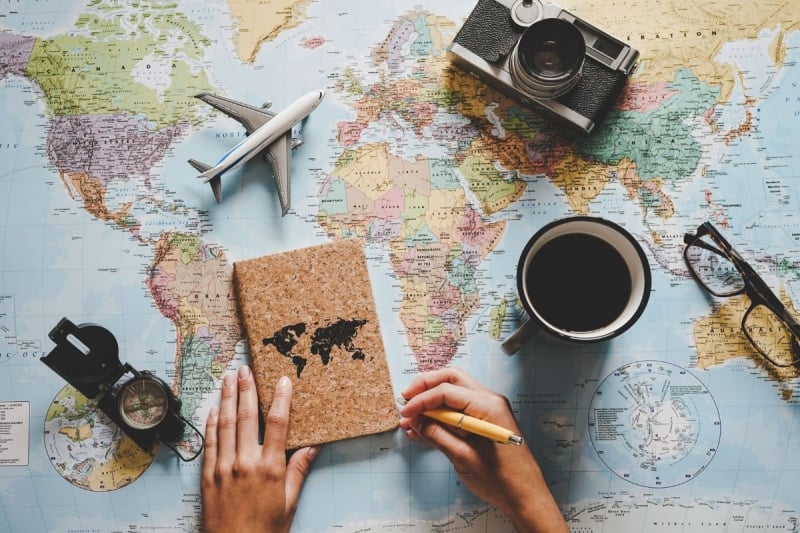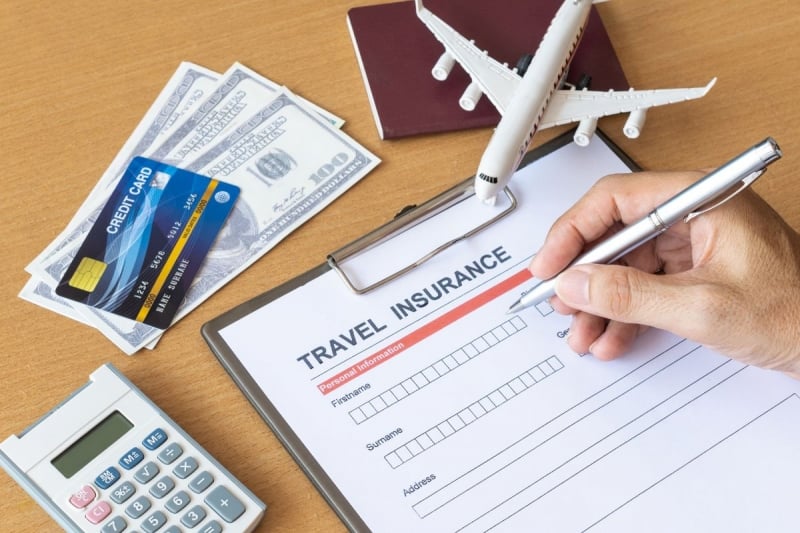You’ve no doubt seen an increase in travel content on your social media feeds. With the pickup in international travel and so many dreamy destinations to visit, it’s an exciting time to start planning your next holiday.
As you begin drawing up your travel plans, understanding how to manage your travel budget properly can help you get the most out of your adventure. After all, you wouldn’t want your long-awaited travel plans to be derailed by a lack of funds.
From determining the right amount of foreign currency to carry to maximising the benefits of your credit cards, here are 10 essential money management tips for the modern globetrotter that are equally as important as a fun itinerary.
Also read: Travel Hacks: How to Maximise Flyer Miles and Points for Your Next Big Trip
How to manage your money when travelling
1. Having a travel budget helps you plan the most memorable itinerary

Image credit: alessandrobiascioli via Canva Pro
A well-structured travel budget is the key to a memorable and stress-free holiday. By understanding your spending limits, you can make informed decisions about your travel plans and avoid unexpected financial surprises.
When drawing up your travel budget, consider factors such as the duration of your trip, accommodation costs, dining expenses, sightseeing activities, and potential shopping expenses. You’ll also want to consider if any particular experiences might incur additional costs, such as splurging on an expensive meal at a famous restaurant or upgrading to a premium option at certain attractions.
By allocating funds to these different categories, you’ll gain a clearer picture of your financial resources and can adjust your travel plans accordingly.
2. Ensuring you have enough cash can help avoid awkward situations

Image credit: littlestocker via Canva Pro
One of the vital money management tips for travellers is to ensure that you have enough cash on hand. While digital payments are becoming increasingly common, some places still prefer cash transactions.
Often, these establishments don’t provide electronic payment options either, so having enough cash on hand is necessary and will certainly help avoid unnecessary complications.
3. Using alternative payment methods makes overseas transactions easier

Image credit: shisuka via Canva Pro
One of the lesser-known money management tips for travellers is knowing which alternative payment methods are available in the destinations that you are visiting.
While most locations accept card and cash transactions, there may also be instances where you need to rely on other alternatives. For example, the most popular form of payment in Mainland China is neither cash nor card, but digital payment options via smartphone apps.
In addition, when making travel plans at home, you may need to make payments in advance to establishments overseas (such as when booking hotels and tours in exotic locations), using remittance (international bank transfers).
One of the lesser-known money management tips for travellers is knowing which alternative payment methods are available in the destinations that you are visiting.
While most locations accept card and cash transactions, there may also be instances where you need to rely on other alternatives. For example, the most popular form of payment in Mainland China is neither cash nor card, but digital payment options via smartphone apps.
In addition, when making travel plans at home, you may need to make payments in advance to establishments overseas (such as when booking hotels and tours in exotic locations), using remittance (international bank transfers).
DBS Remit is an example of a remittance service that allows you to enjoy zero-fee, same-day international money transfers in up to 19 different currencies to more than 50 locations across the globe!
From now till 31 Dec 2024, receive S$12 cashback on your first DBS Remit transfer with either a single transaction or multiple transfers within the same calendar month amounting to S$300 on DBS Remit by using the promo code NEWREMIT. Plus, you can stand a chance to win 500,000 miles when you register for Sweeter Deals on DBS Marketplace before you remit.
4. Using a credit card or debit card lets you unlock extra rewards while travelling

Image credit: Proxima Studio via Canva Pro
Many people choose to use a credit card when travelling. Besides offering fast and convenient transactions, they are widely accepted, meaning you don’t have to carry more cash than necessary.
What’s more, some credit cards offer discounts and cashback rewards when used overseas and allow you to collect miles points to spend on your next holiday.
If you prefer using a debit card instead, the DBS Travel Wallet is an option to consider!
All you have to do is link your DBS Visa Debit Card to your DBS multi-currency account (like DBS Multiplier or My Account) to access the 11 different currencies and spend them with zero foreign exchange conversion fees. Just remember to make sure that there is enough foreign currency in the account for your spending amount to be debited.
On top of that, you can set spending limits using the digibank app and enjoy up to 5% cashback when you spend overseas.
5. Choosing your airline and accommodation wisely helps you save money

Image credit: arturmarciniecphotos via Canva Pro
Spending more time researching the best airfare and accommodation deals means spending less money on underwhelming flights and hotels.
When booking a flight, apart from fare prices, consider the airline’s baggage policies. While some airlines may offer generous baggage allowances, these benefits often come at a higher cost. Conversely, budget airlines may have stricter luggage restrictions but offer lower ticket prices.
Similarly, when booking your accommodation, you’ll want to weigh the pros and cons of each option. Some hotels may offer lower prices, but they may be located in areas that aren’t as convenient for travellers, while hotels that are situated near tourist hotspots often charge a higher price.
By comparing prices across multiple booking platforms, you can make informed decisions and choose the best options that suit your needs and budget. Make use of travel aggregators, like DBS Travel Marketplace to compare flight and hotel prices, and find discounts and deals that help you save even more on your travel expenses.
6. Keeping your bank in the loop offers better control over your money

Image credit: SDI Productions via Canva Pro
Before embarking on your holiday, ensure your credit cards are authorized for international use. With DBS Payment Controls and digibank, you can easily manage your card settings with just a tap on your phone.
For example, if you happen to lose your card while travelling, you can quickly block it using the digibank app.
In addition to that, be sure that you know how to reach your bank while you’re abroad, in case any assistance is needed.
7. Protecting yourself with travel insurance is an underrated tip

Image credit: Noey smiley via Canva Pro
Getting travel insurance is arguably the most valuable money management tip for travellers in today’s world.
Whether it be lost luggage at the airport, medical emergencies, or unexpected trip cancellations, travel insurance provides financial protection against a multitude of unforeseen circumstances.
Having travel insurance like TravellerShield Plus helps mitigate the financial impact of any unfortunate events that affect you on your travels and safeguards your well-being.
Apart from a wide spectrum of coverage, TravellerShield Plus now offers coverage for travel delays as short as 30 minutes and even covers any Frequent Flyer Miles or Hotel Loyalty Points lost in case of trip cancellation. What’s more, with erratic weather and climate changes leading to more frequent unexpected emergencies, it’s also a good idea to have medical evacuation coverage just in case.
For added security, you can also eRegister your itinerary with the Singapore Ministry of Foreign Affairs. That way, you can be contactable in the event of an emergency.
8. Trying out free experiences can offer a wealth of benefits

Image credit: fotoVoyager via Canva Pro
Before you embark on your next adventure, consider looking for free activities and experiences available at your chosen destination. Many popular tourist spots offer a variety of options for budget-conscious travellers.
What’s more, with cultural immersion and sustainable travel becoming increasingly popular, visiting museums and joining walking tours by locals allows you to truly experience the local culture of your destination.
By doing so, you can discover hidden gems, and save money on your overall travel expenses.
9. Finding affordable travel options helps you save on daily transportation

Image credit: Pakorn via Canva Pro
Another great money management tip when travelling abroad is to look for the most cost-effective way to utilise local transport.
For example, using the Japan Rail Pass is the most affordable way to travel around Japan since it offers unlimited, nationwide travel on almost all trains operated by Japan Railways.
Meanwhile, cities like Rome and Geneva also have City Cards that offer unlimited rides on public transport within specified durations. Some of them even include free entry to certain attractions.
Doing a little research on your travel options within your chosen destination can be a ton of help when it comes to managing your money and expenses.
10. Securing your cash lets you explore with ease of mind

Image credit: Thomas Demarczyk via Canva Pro
When travelling, one of the most basic money management tips is to ensure that your cash is safe. One way to do that is to only carry a certain amount with you and keep the rest stashed in the hotel safe. Just ensure that you remember the combination.
If a safe isn’t available at the place you are staying, you may choose to keep your cash in a locked suitcase or backpack. Consider attaching your backpack to immovable furniture for added security.
As for the cash you’re carrying as you go out and about, consider investing in a money belt of concealable pouches. If you’re keeping your cash in a bag, opt for bags with good anti-theft measures like tougher fabrics or secure zips.
Learning how to manage your money during your trip abroad is an invaluable lesson. You could even say that it’s the most crucial part of planning any trip abroad. Hopefully, these money management tips have given you a better idea of how to plan your trips financially, so you can now focus on the most important part — picking a destination to fuel your wanderlust!
Brought to you by DBS Singapore




